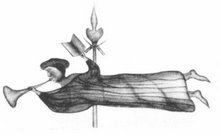Svithing Page One
.
The current First Presidency message, President Eyring speaks on unity, being one.
This sense of Zion can be hard to develop, but obviously it is founded on love and thinking the best of each other. I excerpt one paragraph, then leave the rest to you:
If we are to have unity, there are commandments we must keep concerning how we feel. We must forgive and bear no malice toward those who offend us. The Savior set the example from the cross: “Father, forgive them; for they know not what they do” (Luke 23:34). We do not know the hearts of those who offend us. Nor do we know all the sources of our own anger and hurt. The Apostle Paul was telling us how to love in a world of imperfect people, including ourselves, when he said, “Charity suffereth long, and is kind; charity envieth not; charity vaunteth not itself, is not puffed up, doth not behave itself unseemly, seeketh not her own, is not easily provoked, thinketh no evil” (1 Corinthians 13:4–5). And then he gave solemn warning against reacting to the faults of others and forgetting our own when he wrote, “For now we see through a glass, darkly; but then face to face: now I know in part; but then shall I know even as also I am known” (1 Corinthians 13:12).


